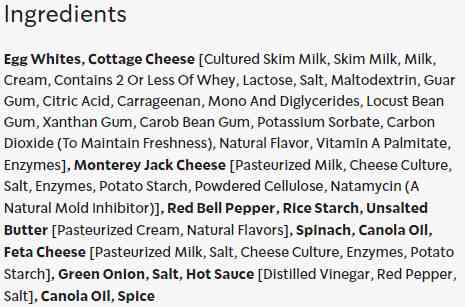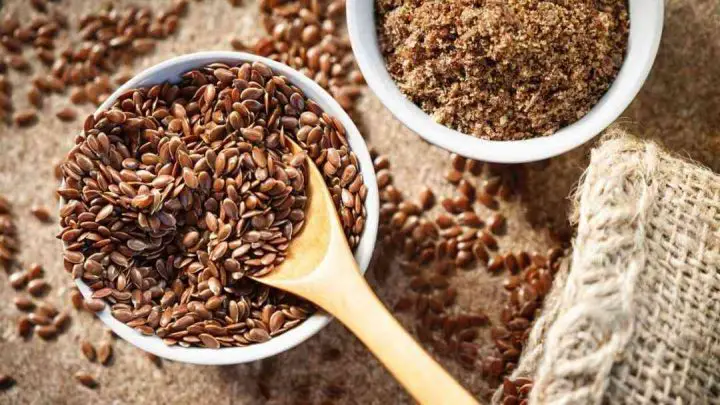Starbucks egg bites were developed to adhere to the ever-changing customer preference when it comes to breakfast. The egg bites are cooked using a “sous vide” method, a French process of cooking food in a vacuum-sealed container at a very precise temperature for a longer period of time.
This method creates a velvety, creamy texture unlike any other type of preparation. Starbucks offers different varieties: ham, cheddar, and pepper; bacon and gruyere; and egg white and red pepper. They have become a hit among customers on the go, who are looking to maximize their protein intake and decrease their carbohydrate intake in the morning. However, these tiny little bites may not be the best choice for those following particular diets or lifestyles, including keto.
Starbucks egg bites are a great source of protein, but there are a number of reasons they are not good for those following the keto diet.

#1 – High Amount of Net Carbohydrates
The egg bites contain between 12 and 19 grams of protein per serving which is beneficial for those on the ketogenic lifestyle.
However, each serving also contains 9 – 13 grams of net carbohydrates and typically the keto diet restricts net carbohydrates to a total of 20-30 grams per day.
Those on the ketogenic diet may want to avoid these bites if they already have difficulty with keeping their daily carbohydrate intake within the guidelines.
#2 – Canola Oil
Canola oil is a vegetable oil that is widely used in cooking and in various packaged products. It has become one of the most popular fats used in the commercial food industry and is used in Starbucks egg bites. In recent years, there has been a lot of concern over its potential impact on one’s health.
Canola oil is very inflammatory as it contains a high amount of omega-6 fat. While omega-6 is essential in the diet for the body to perform properly, the rate of omega-6 to omega-3 is disproportionate in canola oil and Western diets as a whole. This imbalance can be linked to a number of chronic conditions, including heart disease and obesity.
Canola oil is almost always genetically modified and engineered and goes through an intense process of refinement before being made available to customers. This refinement involves bleaching and deodorizing using chemicals, which decreases the vitamin, antioxidant and essential fatty acid properties of the oil.
Canola oil and other oils that go through intense processing, such as refinement, should be avoided in a ketogenic lifestyle.
#3 – Carrageenan
One of the first ingredients in the egg bites is cottage cheese, which contains the common food additive carrageenan. Carrageenan is extracted from red seaweed and processed with alkali to create the food additive.
However, many scientists have warned about the harmful effects of carrageenan on the body. A number of studies have shown the additive to cause inflammation in the gastrointestinal tract, high rates of ulcers, intestinal lesions and malignant tumors.
Prolonged inflammation in the GI system can be linked to chronic illnesses and diseases, including cancer. Any product linked to inflammation is not advisable for those on the keto diet.
#4 – Monoglycerides and Diglycerides
Monoglycerides and diglycerides, found in Starbucks egg bites, are used by food manufacturers to extend a product’s shelf life. They act as emulsifiers, combining ingredients containing fat with those containing
water.
Mono- and diglycerides are similar to triglycerides which is the predominant fat found in food. However, unlike triglycerides, mono- and diglycerides are emulsifiers, not lipids.
Mono- and diglycerides are most commonly found in the least healthy foods on the market, including candy, ice cream, margarine, and baked goods. These emulsifiers can contain trans fat, leading to high LDL cholesterol levels, inflammation, and obesity.
#5 – Maltodextrin
Maltodextrin, found in the cottage cheese used in these egg bites, is a common ingredient in packaged foods. It is a starchy, white powder used by manufacturers to improve shelf-life, thickness, and flavor of foods.
Maltodextrin can be made from any starchy food, such as potatoes, rice, wheat, and corn, and is then processed using hydrolysis. The powder helps bind ingredients together and is also used to replace sugar or fat in low-calorie foods. The consumption of maltodextrin increases a person’s carbohydrate intake which is not ideal for those on the keto diet.
Though Generally Recognized as Safe by the FDA, maltodextrin has been linked to several health conditions, including diabetes, intestine damage, Irritable Bowel Disease, allergies, and food intolerances.
Ditch The Egg Bites And Go For Whole Foods
When following the ketogenic diet, it is best to consume whole, single-ingredient foods and avoid additives and chemicals as much as possible. Meat, poultry, fatty fish, eggs, butter, avocados, and low-carb veggies are all foods to incorporate into your keto diet.
Alcohol, legumes, sugary fruits, grains, and sugary foods should all be avoided in order to help your body reach ketosis.
While Starbucks egg bites can be a great healthier option for an on-the-go meal, those following the keto diet should avoid them.
The bites contain a number of stabilizers, additives, inflammatory ingredients, and a high number of carbohydrates. All of which can lead to a number of different health issues.
A better option at Starbucks might be a turkey and egg white sandwich, without the bun or one of their protein boxes, but avoiding the fruit.
Starbucks Egg Bites FAQs
Starbucks Egg Bites are not keto-friendly because it contains a high amount of net carbohydrates (between 9 to 13 net carbs per serving). Moreover, it also contains canola oil, carrageenan, mono and di-glycerides, and maltodextrin which are all linked to health risks.
According to Starbucks.com, Starbucks Egg Bites are made of Egg Whites, Cottage Cheese [Skim Milk, Cultured Skim Milk, Contains 2 Or Less Of Whey, Milk, Lactose, Cream, Maltodextrin, Salt, Guar Gum, Carrageenan, Citric Acid, Mono And Diglycerides, Xanthan Gum, Locust Bean Gum, Carob Bean Gum, Carbon Dioxide, Potassium Sorbate, Natural Flavor, Enzymes, Vitamin A Palmitate], Monterey Jack Cheese, Red Bell Pepper, Unsalted Butter, Rice Starch, Spinach, Feta Cheese, Canola Oil, Green Onion, Salt, Hot Sauce, and Spice.
According to Starbucks.com, a typical serving size of 130 grams contain 170 calories, 11 grams of carbohydrates (3 grams from sugar), 12 grams of protein, and 8 grams of fat (5 grams from saturated fat).
Starbucks Egg Bites contain milk and milk products so it is not lactose-free.
Starbucks Egg Bites don’t contain wheat, rye, or barley products so it is gluten-free.
References
- https://www.ncbi.nlm.nih.gov/pmc/articles/PMC5119743/
- https://www.ncbi.nlm.nih.gov/pubmed/29469913
- https://www.ncbi.nlm.nih.gov/pmc/articles/PMC292920/
- https://www.ncbi.nlm.nih.gov/pubmed/24582585





